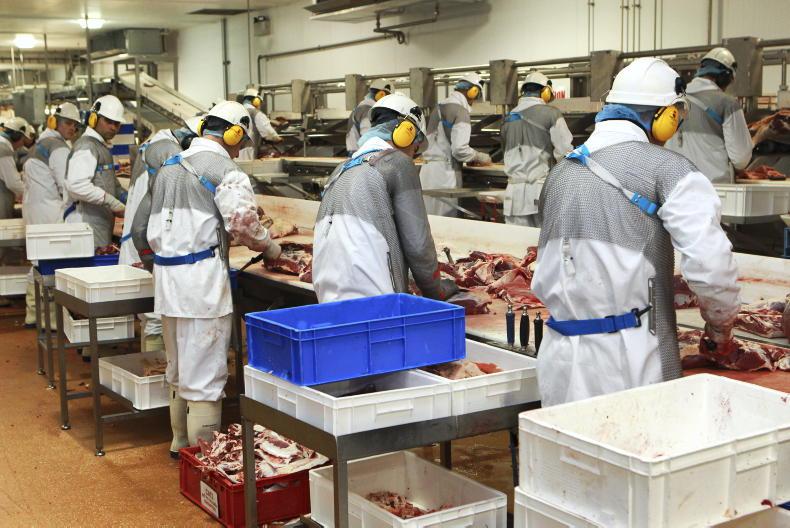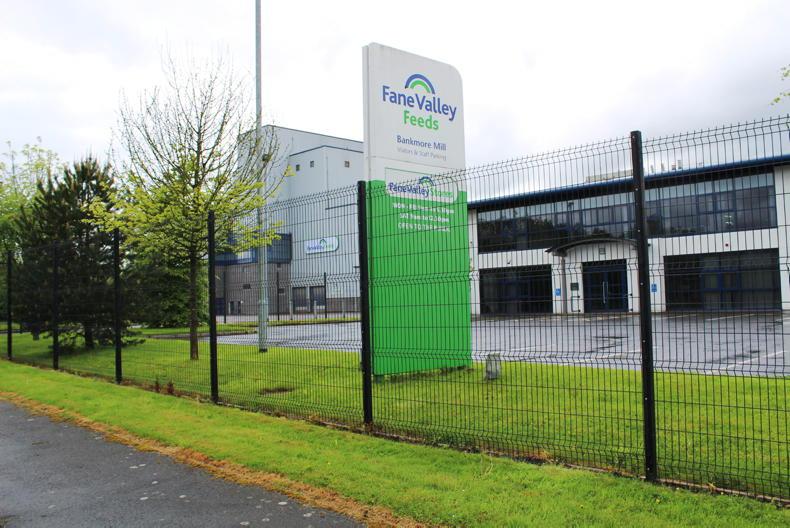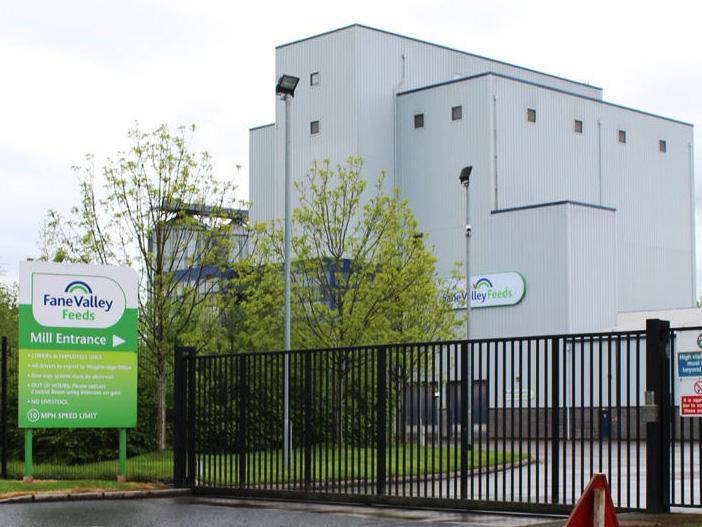Last week’s announcement that ABP had bought out Fane Valley’s remaining share in the Slaney, Irish Country Meats (ICM) and Linden meat processing businesses completed a process that began in late 2015.
Slaney and ICM at that point were owned jointly by the Allen family and Linden Foods the red meat division of Fane Valley, a Northern Ireland-based farmer owned co-op that then also had interests in dairy processing.
It was something of a surprise that when the Allen family decided to withdraw from the business, Fane Valley through Linden didn’t purchase their share.
Instead it was purchased by ABP and a joint venture (JV) was established with Fane Valley to operate the business. Subsequently, ABP took a 50% interest in Linden, leading many to believe the JV was a stepping stone to ABP acquiring the entire business and that is what was announced last week.
Linden Foods is one of Northern Ireland’s largest beef and sheep processors
Slaney is one of the largest cattle processing factories in the Republic of Ireland, handling an estimated 90,000 cattle per year. Similarly with Linden in the North, they handle about 70,000 cattle and about 125,000 sheep.
In the Republic of Ireland, the sheepmeat side of the business is taken care of by the dedicated sheep processing factories operated by Irish Country Meats in Navan and Camolin.
Linden Foods is one of Northern Ireland’s largest beef and sheep processors, and also has an abattoir in the north of England plus Kettyle’s Irish Foods, a specialised processing business in Co Fermanagh.
Since the original deal was cleared by the EU competition authorities in late 2016, these businesses have operated as a joint venture (JV) between Fane Valley and ABP, trading separately and publishing annual accounts. There was considerable integration at an operational level, with Slaney in particular tapping into many of ABP’s global customers.
In terms of sheepmeat, it was ABP that gained most from the JV, given that ICM processed over 40% of the kill in the Republic of Ireland
Linden Foods in Northern Ireland also availed of this, though to a lesser extent as it has a strong customer base of its own built around Marks & Spencer and its modern retail packing and research facility adjacent to its factory in Dungannon, Co Tyrone.
In terms of sheepmeat, it was ABP that gained most from the JV, given that ICM processed over 40% of the kill in the Republic of Ireland, with a large number of the sheep sourced in NI.
It was also at the leading edge in developing lamb for the retail sector, particularly in the EU with A. Lonhienne, one of Belgium’s leading sheepmeat processors.
Until this, ABP had no presence in sheepmeat processing in the Republic of Ireland and had one factory in NI.
In NI, ABP will now own three of the seven large factories
This acquisition makes ABP the largest processor of beef and sheepmeat on the island of Ireland, putting it comfortably ahead of Dawn (Dunbia in Northern Ireland and Britain) and Kepak in third place.
The Irish Farmers Journal estimates that the seven beef factories owned by ABP in the Republic of Ireland will kill around 500,000 cattle out of the 1.8m slaughtered annually.
In NI, ABP will now own three of the seven large factories, which the Irish Farmers Journal estimates kill 185,000 cattle annually between them.
These totals represent about 40% of the total kill in NI and 28% approximately in the Republic of Ireland.
With sheepmeat, ABP will have about 42% of the national kill at an estimated 1.2m sheep in the Republic of Ireland and 60% share in NI where between ABP’s Lurgan factory and Linden they process an estimated 275,000 sheep annually.
What it means for
livestock procurement
Operationally, farmers dealing with these factories will notice little if any change apart from some rebranding perhaps. However, instead of trading separately with their own separate administrative structure, they are now likely to be absorbed into the wider ABP business in Ireland and the UK.
What will be interesting to observe is development of procurement policy. Northern Ireland has typically exported around 400,000 lambs south every year, almost half its production and ICM was a major buyer of these.
Will ABP continue this policy now that it is in sole ownership or will it want ICM to leave the NI lambs for the Lurgan and Linden factories? However, with significant investment required in sheep processing north of the border to handle additional lambs, it might be a case of ‘if it ain’t broke, don’t fix it’.
Much of this beef was re-sold into the Republic of Ireland retail market
The same applies for cattle – Linden had been bringing up around 100 cattle per week from the south for processing and had encouraged NI finishers to source Republic of Ireland cattle for finishing over the past winter. Much of this beef was re-sold into the Republic of Ireland retail market. Again, it will be interesting if this policy continues or is changed.
Will the deal get approval?
The competition authorities in London will be notified in relation to the Northern Ireland aspect of the business and in the EU in relation to the Republic of Ireland business.
It is thought that a simplified application may be sufficient as this is the buyout of an existing JV, with the original JV having been subject to a full investigation.
It was strongly opposed by the farm organisations at the time.
The deal puts ABP in a particularly strong position in NI for both cattle and sheepmeat and the UK is now outside the EU so will come to an independent and separate decision on whether or not to have a full investigation of the deal.
Slaney and ICM were rare examples in the Irish meat processing industry that provided a window to look into the profitability of factories in processing. ABP doesn’t publish annual accounts and farmers will be watching closely if this deal means the end of a light being shone on profitability in these factories.
This is an ongoing issue for farmers across the industry and the cause of the lack of confidence in factories giving farmers a fair deal.
Further power plays may be on the cards
Farmers will instinctively believe that continued consolidation on the processing side of the industry reduces their options when it comes to selling their livestock.
There will also be a close watch on the cross-border trade for live cattle and sheep to see if procurement patterns that operated under the JV with Fane Valley continue or are changed in a way that reduces farmer options either side of the border.
Yet a multitude of smaller independent factories doesn’t necessarily mean better prices for farmers. Larger groups benefit from economies of scale that mean they are able to negotiate with the largest customers from a position of relative strength.
What farmers need is confidence that the meat processing industry is treating them fairly
During the pandemic when the catering and wholesale trade was virtually eliminated, the independent meat processors lost business while the large groups with major supermarket outlets gained.
What farmers need is confidence that the meat processing industry is treating them fairly and this is impossible to achieve without transparency in the supply chain beyond the farm gate. The appointment of an Ombudsman with the appropriate powers in this area is a necessary step to achieving transparency.
The other interesting angle is whether the present ownership structure will settle as it is or will there be further rationalisation. It was once said by an industry stalwart that everything is for sale, it is just a case of negotiating the price if two parties are interested.
In theory, any of the independents could be snapped up by one of the groups.
Global players
The other angle is will one of the large global players see one of the Irish groups as a base to develop the EU and UK markets.
With the Mercosur deal agreed (though not approved) and the UK developing its own trade policy, a decent-sized EU group that has a strong presence in both the EU and UK would hold some attraction as an entry to one of the world’s high-value markets.
Northern Ireland and have recently agreed the purchase of Vivera
JBS, the Brazilian processing giant, was reported to be sniffing around Irish factories before. They control US company Pilgrim’s Pride, the owner of the Moy Park poultry business in Northern Ireland and have recently agreed the purchase of Vivera, a Dutch plant-based food manufacturer in a €341m deal. Could there be a further power play still to come?
Last week’s announcement that ABP had bought out Fane Valley’s remaining share in the Slaney, Irish Country Meats (ICM) and Linden meat processing businesses completed a process that began in late 2015.
Slaney and ICM at that point were owned jointly by the Allen family and Linden Foods the red meat division of Fane Valley, a Northern Ireland-based farmer owned co-op that then also had interests in dairy processing.
It was something of a surprise that when the Allen family decided to withdraw from the business, Fane Valley through Linden didn’t purchase their share.
Instead it was purchased by ABP and a joint venture (JV) was established with Fane Valley to operate the business. Subsequently, ABP took a 50% interest in Linden, leading many to believe the JV was a stepping stone to ABP acquiring the entire business and that is what was announced last week.
Linden Foods is one of Northern Ireland’s largest beef and sheep processors
Slaney is one of the largest cattle processing factories in the Republic of Ireland, handling an estimated 90,000 cattle per year. Similarly with Linden in the North, they handle about 70,000 cattle and about 125,000 sheep.
In the Republic of Ireland, the sheepmeat side of the business is taken care of by the dedicated sheep processing factories operated by Irish Country Meats in Navan and Camolin.
Linden Foods is one of Northern Ireland’s largest beef and sheep processors, and also has an abattoir in the north of England plus Kettyle’s Irish Foods, a specialised processing business in Co Fermanagh.
Since the original deal was cleared by the EU competition authorities in late 2016, these businesses have operated as a joint venture (JV) between Fane Valley and ABP, trading separately and publishing annual accounts. There was considerable integration at an operational level, with Slaney in particular tapping into many of ABP’s global customers.
In terms of sheepmeat, it was ABP that gained most from the JV, given that ICM processed over 40% of the kill in the Republic of Ireland
Linden Foods in Northern Ireland also availed of this, though to a lesser extent as it has a strong customer base of its own built around Marks & Spencer and its modern retail packing and research facility adjacent to its factory in Dungannon, Co Tyrone.
In terms of sheepmeat, it was ABP that gained most from the JV, given that ICM processed over 40% of the kill in the Republic of Ireland, with a large number of the sheep sourced in NI.
It was also at the leading edge in developing lamb for the retail sector, particularly in the EU with A. Lonhienne, one of Belgium’s leading sheepmeat processors.
Until this, ABP had no presence in sheepmeat processing in the Republic of Ireland and had one factory in NI.
In NI, ABP will now own three of the seven large factories
This acquisition makes ABP the largest processor of beef and sheepmeat on the island of Ireland, putting it comfortably ahead of Dawn (Dunbia in Northern Ireland and Britain) and Kepak in third place.
The Irish Farmers Journal estimates that the seven beef factories owned by ABP in the Republic of Ireland will kill around 500,000 cattle out of the 1.8m slaughtered annually.
In NI, ABP will now own three of the seven large factories, which the Irish Farmers Journal estimates kill 185,000 cattle annually between them.
These totals represent about 40% of the total kill in NI and 28% approximately in the Republic of Ireland.
With sheepmeat, ABP will have about 42% of the national kill at an estimated 1.2m sheep in the Republic of Ireland and 60% share in NI where between ABP’s Lurgan factory and Linden they process an estimated 275,000 sheep annually.
What it means for
livestock procurement
Operationally, farmers dealing with these factories will notice little if any change apart from some rebranding perhaps. However, instead of trading separately with their own separate administrative structure, they are now likely to be absorbed into the wider ABP business in Ireland and the UK.
What will be interesting to observe is development of procurement policy. Northern Ireland has typically exported around 400,000 lambs south every year, almost half its production and ICM was a major buyer of these.
Will ABP continue this policy now that it is in sole ownership or will it want ICM to leave the NI lambs for the Lurgan and Linden factories? However, with significant investment required in sheep processing north of the border to handle additional lambs, it might be a case of ‘if it ain’t broke, don’t fix it’.
Much of this beef was re-sold into the Republic of Ireland retail market
The same applies for cattle – Linden had been bringing up around 100 cattle per week from the south for processing and had encouraged NI finishers to source Republic of Ireland cattle for finishing over the past winter. Much of this beef was re-sold into the Republic of Ireland retail market. Again, it will be interesting if this policy continues or is changed.
Will the deal get approval?
The competition authorities in London will be notified in relation to the Northern Ireland aspect of the business and in the EU in relation to the Republic of Ireland business.
It is thought that a simplified application may be sufficient as this is the buyout of an existing JV, with the original JV having been subject to a full investigation.
It was strongly opposed by the farm organisations at the time.
The deal puts ABP in a particularly strong position in NI for both cattle and sheepmeat and the UK is now outside the EU so will come to an independent and separate decision on whether or not to have a full investigation of the deal.
Slaney and ICM were rare examples in the Irish meat processing industry that provided a window to look into the profitability of factories in processing. ABP doesn’t publish annual accounts and farmers will be watching closely if this deal means the end of a light being shone on profitability in these factories.
This is an ongoing issue for farmers across the industry and the cause of the lack of confidence in factories giving farmers a fair deal.
Further power plays may be on the cards
Farmers will instinctively believe that continued consolidation on the processing side of the industry reduces their options when it comes to selling their livestock.
There will also be a close watch on the cross-border trade for live cattle and sheep to see if procurement patterns that operated under the JV with Fane Valley continue or are changed in a way that reduces farmer options either side of the border.
Yet a multitude of smaller independent factories doesn’t necessarily mean better prices for farmers. Larger groups benefit from economies of scale that mean they are able to negotiate with the largest customers from a position of relative strength.
What farmers need is confidence that the meat processing industry is treating them fairly
During the pandemic when the catering and wholesale trade was virtually eliminated, the independent meat processors lost business while the large groups with major supermarket outlets gained.
What farmers need is confidence that the meat processing industry is treating them fairly and this is impossible to achieve without transparency in the supply chain beyond the farm gate. The appointment of an Ombudsman with the appropriate powers in this area is a necessary step to achieving transparency.
The other interesting angle is whether the present ownership structure will settle as it is or will there be further rationalisation. It was once said by an industry stalwart that everything is for sale, it is just a case of negotiating the price if two parties are interested.
In theory, any of the independents could be snapped up by one of the groups.
Global players
The other angle is will one of the large global players see one of the Irish groups as a base to develop the EU and UK markets.
With the Mercosur deal agreed (though not approved) and the UK developing its own trade policy, a decent-sized EU group that has a strong presence in both the EU and UK would hold some attraction as an entry to one of the world’s high-value markets.
Northern Ireland and have recently agreed the purchase of Vivera
JBS, the Brazilian processing giant, was reported to be sniffing around Irish factories before. They control US company Pilgrim’s Pride, the owner of the Moy Park poultry business in Northern Ireland and have recently agreed the purchase of Vivera, a Dutch plant-based food manufacturer in a €341m deal. Could there be a further power play still to come?









SHARING OPTIONS